Key takeaways:
- Mobile apps significantly impact daily life, often catering to personal interests and needs, making tasks easier and improving well-being.
- App reviews are crucial in making informed choices, helping users navigate through the multitude of available options and avoid disappointments.
- User-friendly design, effective functionality, and developer support are key criteria for evaluating and choosing mobile apps.
- Personalized app discovery through self-assessment, peer feedback, and comprehensive research enhances the effectiveness of the apps selected.
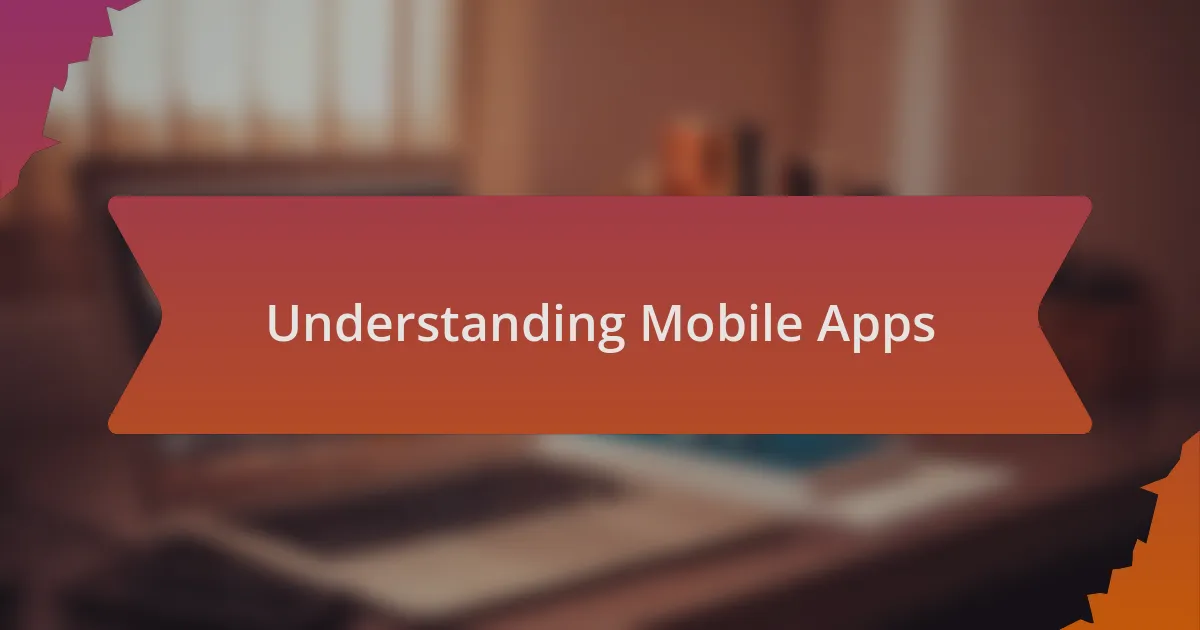
Understanding Mobile Apps
Understanding mobile apps goes beyond just knowing they exist; it’s about appreciating how they shape our lives and simplify our daily tasks. I still remember the excitement I felt when I first discovered a budgeting app that transformed the way I managed my finances. How could a small application on my phone help me save money and stick to my goals so effectively?
Mobile apps are meticulously designed to cater to specific needs, providing tailored experiences that desktop software often just can’t match. One time, I stumbled upon a meditation app while looking for ways to manage stress. It was amazing to realize that with just a few taps, I could access guided meditations and breathing exercises. Doesn’t it make you think about how a simple app can have such a profound impact on mental health?
I often find myself pondering how mobile apps reflect our personalities and preferences. For instance, I have apps that cater to my love for cooking, photography, and even language learning. Isn’t it fascinating that these little pieces of software can teach us new skills or connect us with like-minded people? It’s like carrying a world of possibilities right in our pockets, waiting to be explored.
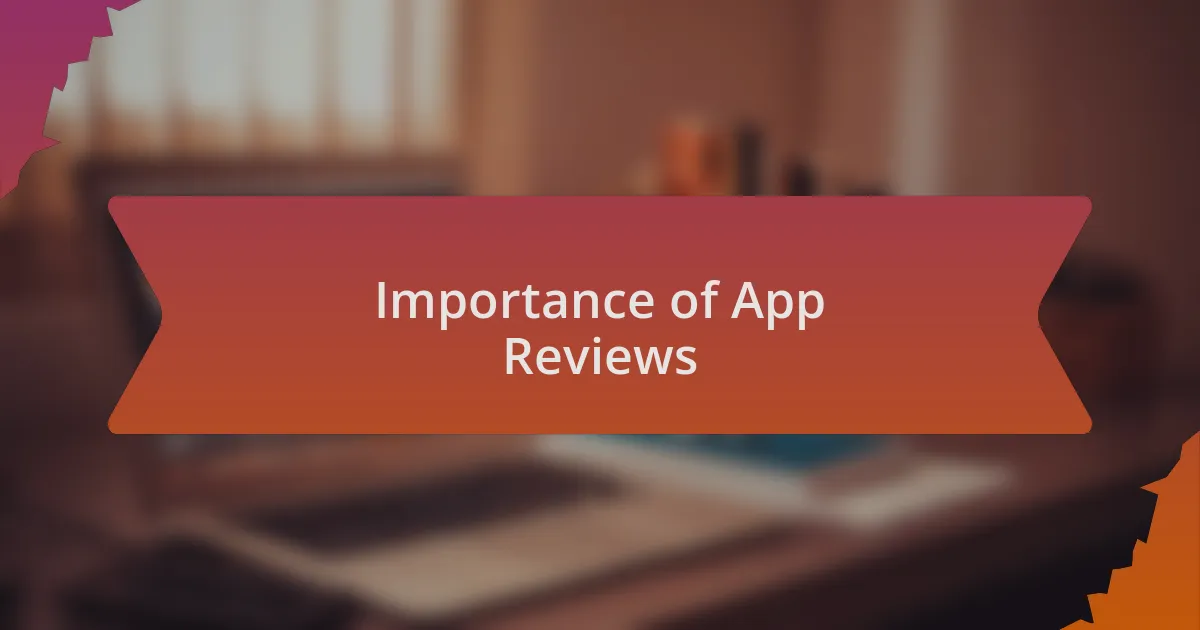
Importance of App Reviews
The value of app reviews cannot be overstated, particularly when so many options are available in the app stores. I remember downloading an app for photo editing, drawn in by flashy screenshots and persuasive marketing. After a few crashes and limited features, I wished I had consulted user reviews first to avoid the disappointment. Isn’t it frustrating to invest time and effort in an app only to find it doesn’t live up to expectations?
Reading app reviews helps navigate this crowded landscape. When I stumbled upon a highly-rated travel app, the enthusiastic feedback from users made me confident in my decision to give it a try. It was refreshing to see real experiences shared, providing insights that went beyond the app’s description. Have you ever noticed how a compelling review can enhance your anticipation for trying something new?
App reviews serve as a filter, helping us discern quality from the noise. I’ve often relied on them to discover hidden gems that I wouldn’t have found otherwise, like a lesser-known game that has become a staple in my free time. Isn’t it empowering to make informed choices based on honest feedback from fellow users?
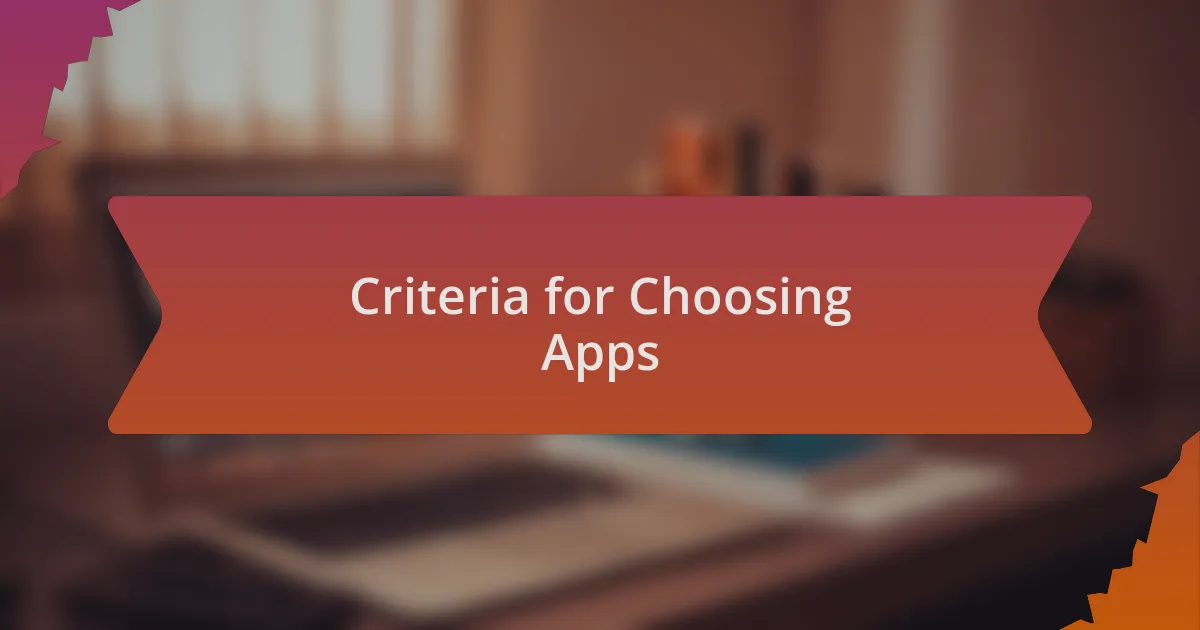
Criteria for Choosing Apps
When I evaluate mobile apps, usability tops my list of criteria. There’s nothing more frustrating than downloading an app that’s complicated to navigate. I recall trying a fitness tracker that looked promising but ended up being cumbersome; it took too long to figure out how to log my workouts. If it’s not user-friendly, I often find myself deleting it within days.
Another essential factor I consider is functionality. An app should perform its advertised tasks effectively. I once downloaded a note-taking app that promised seamless syncing across devices, only to face constant glitches. This experience made me realize that functionality is crucial—who wants to rely on technology that can’t deliver what it promises?
Lastly, I pay close attention to updates and support provided by the developer. Frequent updates indicate that the team is actively improving the app. I’ve been pleasantly surprised when an app I initially found lacking evolved into a must-have tool through continuous enhancements. Have you ever been amazed by how much potential lies in an app after it receives dedicated attention from its developers? It’s the commitment to improvement that often draws me back to certain apps time and again.
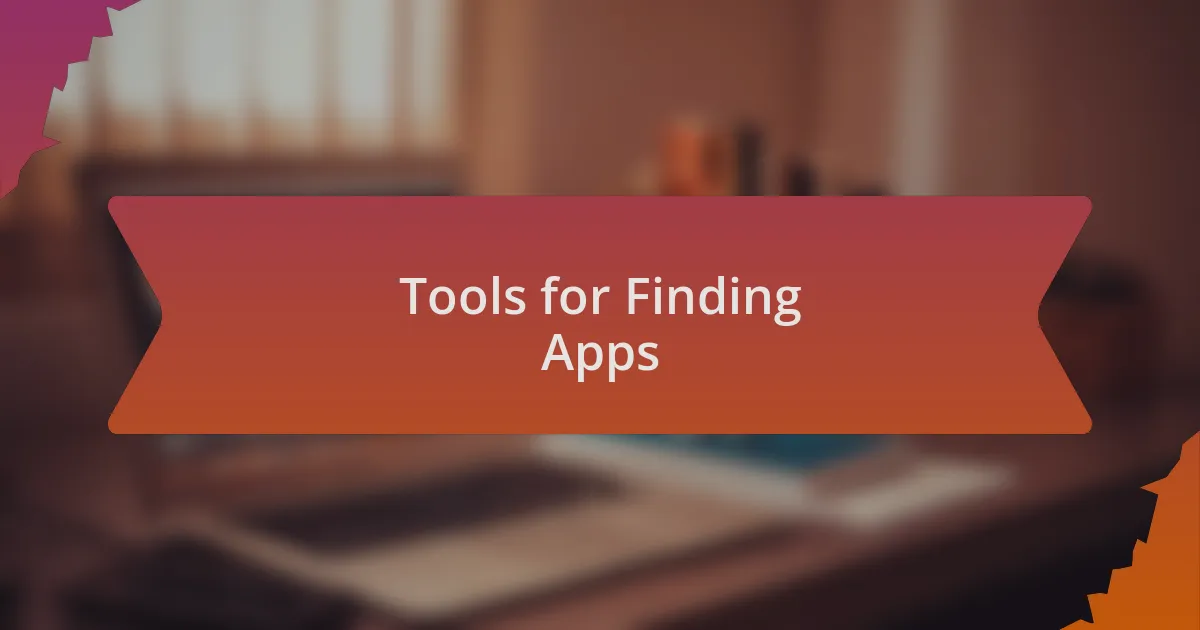
Tools for Finding Apps
When searching for the best mobile apps, I’ve found that app store reviews can be incredibly insightful. There have been times when I excitedly downloaded an app, only to check the reviews and see a trend of negative feedback regarding bugs and poor support. This experience taught me the power of user opinions—sometimes, those little stars or comments can guide you away from a potential mistake.
Another fantastic tool for finding apps is social media platforms and online communities. I remember stumbling upon a discussion in a tech forum where users shared hidden gems for productivity apps. It felt like discovering a secret stash of tools that people swore by. Engaging with these communities often leads to recommendations that you won’t find on mainstream platforms, creating a sense of camaraderie among users with shared interests.
Lastly, I’ve been increasingly relying on curated lists and tech blogs. I distinctly recall reading a blog that highlighted niche apps tailored for language learning—something I had been struggling to find. It was a game-changer because it narrowed down my options to those specially designed for my needs. The meticulous analysis provided by these resources often allows me to sift through the overwhelming choices and find apps that truly resonate with my requirements.
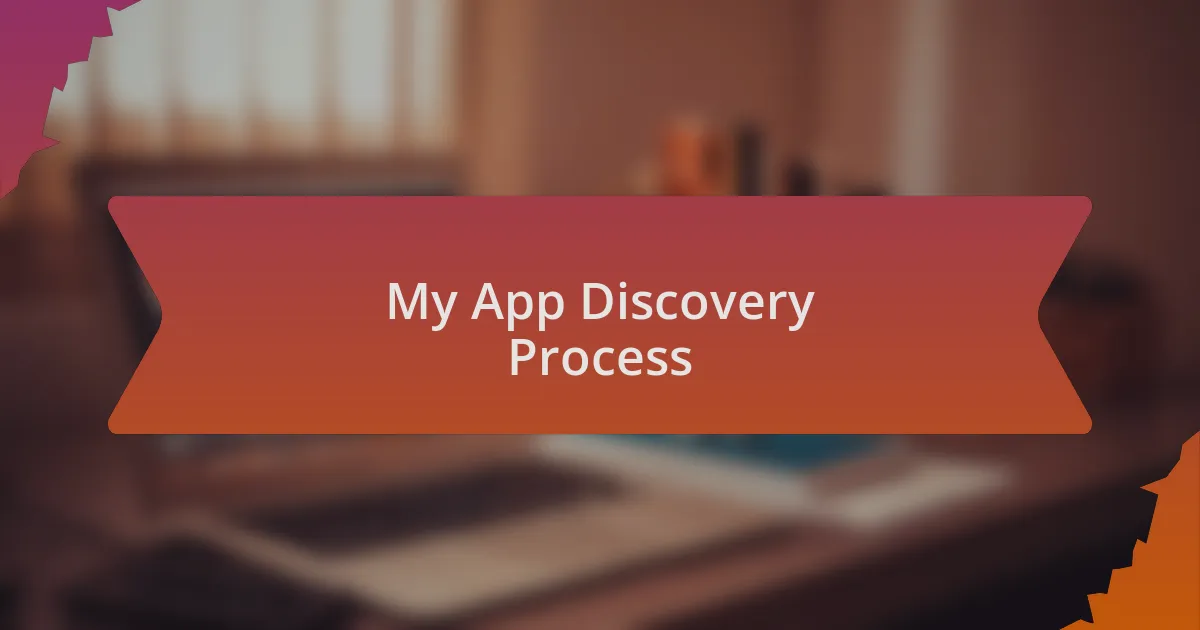
My App Discovery Process
When I embark on my app discovery process, I often start by tapping into my own needs and interests. For instance, I once realized I was spending way too much time managing my finances, which led me to search for budgeting apps specifically. Reflecting on my experiences made me wonder, “What features do I truly need?” This self-assessment not only helps narrow down my search but also ensures that the apps I download will serve a distinct purpose in my life.
Another step in my process involves delving deep into the functionality of potential apps. I vividly remember coming across a fitness tracker that looked promising but had vague descriptions. My curiosity pushed me to explore user-generated content—like YouTube reviews—that showcased the app in action. Seeing real-life usage made all the difference for me; it raised the question, “Does this app genuinely align with my fitness goals?” and helped me make an informed decision.
Moreover, I find the feedback loop from friends and family invaluable. I can’t count how many times I’ve asked, “Have you tried that new photo editing app?” Their recommendations often come loaded with personal experiences and insights that statistics just can’t deliver. This interaction enhances my discovery process, making it not just about finding apps but also about connecting with others over shared tech interests.
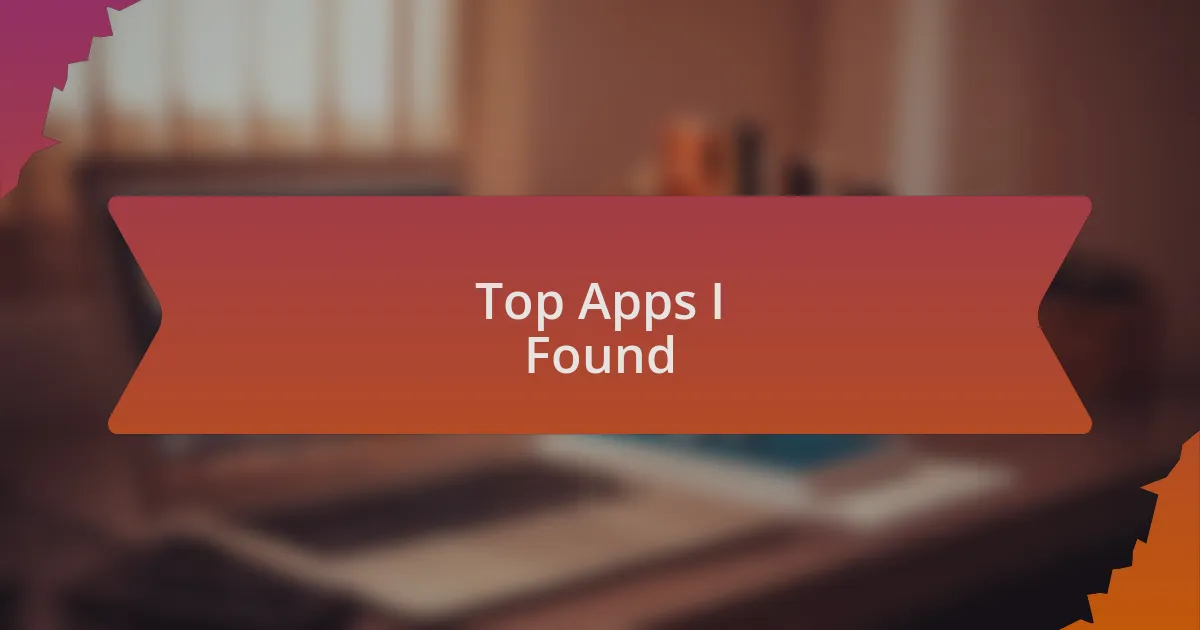
Top Apps I Found
One app that truly stood out during my exploration is Todoist. It has this sleek interface that instantly clicked with me, and the ability to categorize tasks made organizing my day feel like a breeze. I remember feeling overwhelmed with my to-do list, but after using Todoist for a few weeks, it felt like I had my productivity back on track. Have you ever experienced that lightbulb moment when a tool suddenly makes everything fall into place?
Then there’s Headspace, which transformed my approach to mindfulness. Initially, I was skeptical about meditation apps, wondering if they’d really work for me. But after just a few sessions, I found a profound sense of calm amidst my hectic schedule. It got me reflecting on how often we neglect our mental health in the pursuit of busyness. Isn’t it remarkable how a simple app can create such a meaningful shift in our well-being?
Finally, I can’t ignore the impact of MyFitnessPal on my health journey. Tracking my meals became so much easier with its extensive food database that even included restaurant items. I always thought keeping a food diary would feel tedious, but seeing my nutritional stats in real time sparked motivation I didn’t know I needed. Have you ever noticed how small changes in habit, facilitated by the right app, can lead to significant lifestyle improvements?
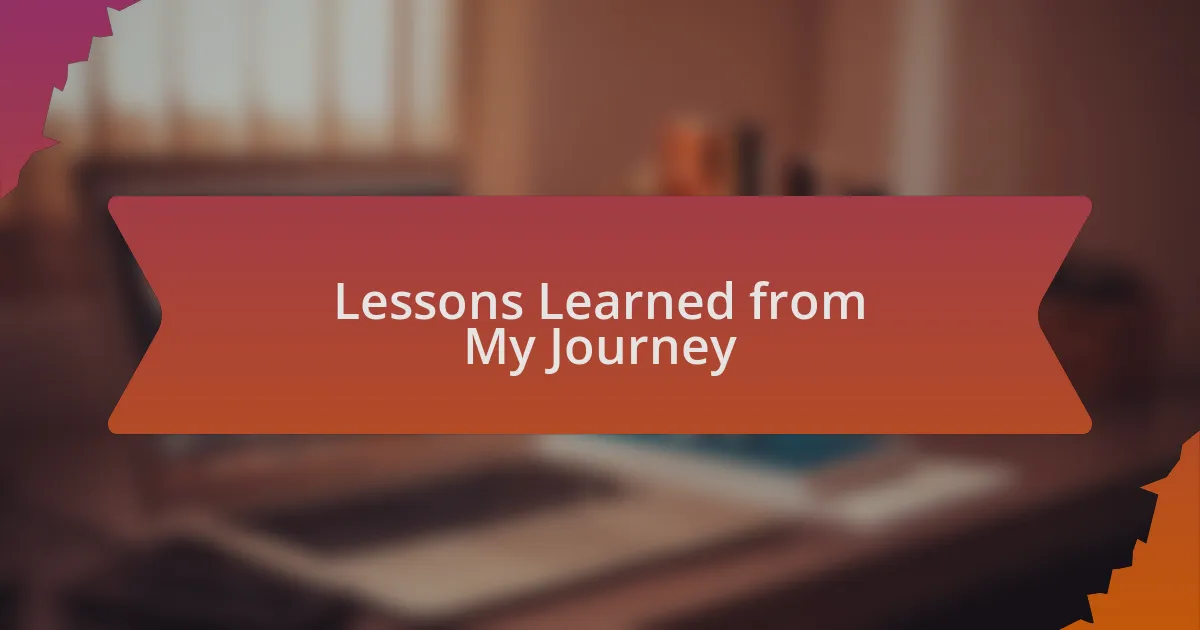
Lessons Learned from My Journey
Throughout my journey, I’ve come to realize the importance of being open-minded when trying new apps. Initially, I dismissed a few that I later discovered were quite beneficial. I remember my first hesitant download of a budgeting app; skepticism clouded my judgement, yet after diving in, I found it surprisingly empowering to see my financial habits laid out clearly. It’s a reminder that sometimes our first impressions can be misleading—have you ever judged an app too soon?
Another significant lesson I learned is that not every solution is one-size-fits-all. I tried several fitness apps, and while some friends swore by their favorites, I experienced frustration using them. It was only when I sought out what truly suited my lifestyle—like a simpler step tracker—that I realized the value in personalization. How often do we overlook the apps that align with our unique needs?
Lastly, patience is crucial on this journey. I occasionally felt impatient when an app didn’t deliver immediate results. There were times I wanted to give up, thinking, “Is all this effort really worth it?” But I learned that integration takes time; the consistent use of an effective tool can gradually transform how I manage my tasks, health, and overall well-being. Isn’t it fascinating how the right app, combined with a little persistence, can lead to such rewarding changes?